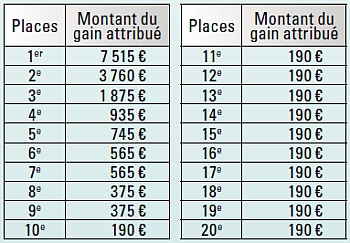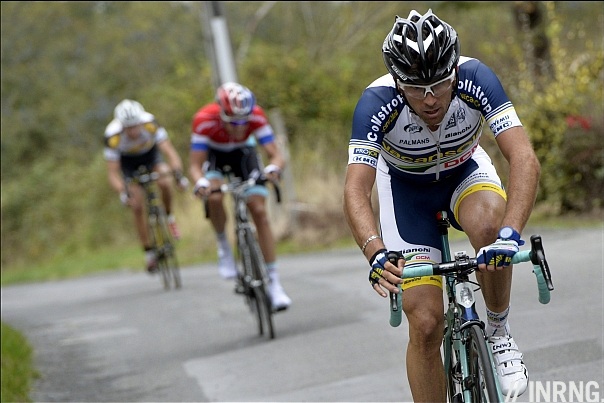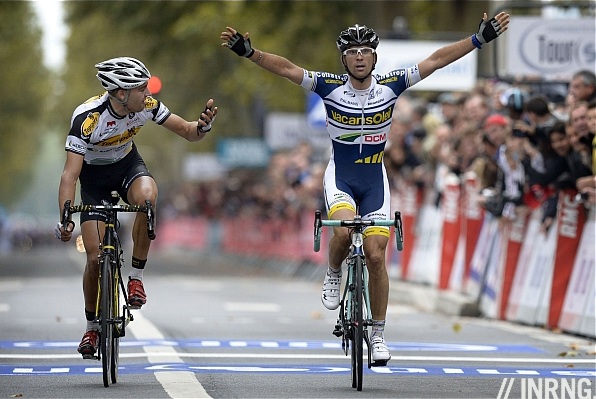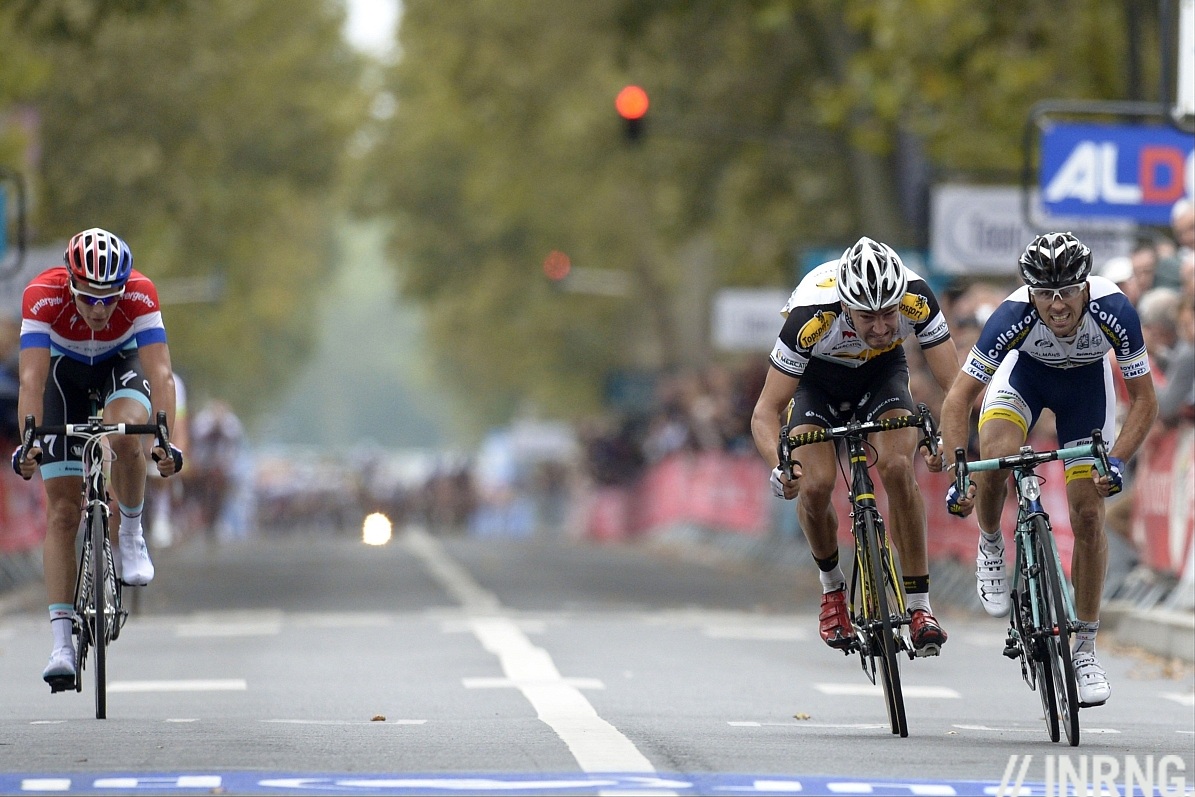Marco Marcato wins Paris-Tours from a three man sprint. The trio held off a surprise attack by John Degenkolb, the German sprinter went rogue with 10km to go and almost caught the leaders in the final straight.
Dutch champion Niki Terpstra launched the sprint and Marcato has swept across the road, forcing Laurens De Vreese to change direction. This briefly robbed the Belgian of momentum and gave Marcato time to sit up and celebrate as he won the fastest ever one day classic, averaging 48.629km/h. This was the moment the race was won.
A light tailwind helped a fast start but it was the legs that made the difference. A group of 11 went away with Michael Hepburn (Orica-Greenedge), Arnaud Gérard (FDJ-BigMat), László Bodrogi (Team Type 1), Yannick Talabardon (Saur-Sojasun), Koen de Kort (Argos-Shimano), Wilco Kelderman (Rabobank), Gatis Smukulis (Katusha) and team mates Karsten Kroon and Michael Mørkøv (Saxo Bank-Tinkoff), plus Jérôme Pineau and Sylvain Chavanel (Omega Pharma-Quickstep). Several of these riders are proven rouleurs with Bodrogi and Chavanel as time trial specialists, Kelderman was a revelation with fourth place in the Dauphiné time trial. And this is before we get to breakaway specialist Mørkøv and neo-pro Hepburn, an ace on the track.
They averaged over 50km/h in the first hour and after two hours of racing the average speed was still 48km/h. Behind BMC and FDJ kept things in check, aided by mighty Team Sky and the modest Bretagne-Schuller. As strong as the riders in the lead were, the bunch never let them get much more than four minutes and with 60km to go the gap was down to a meagre two minutes. Perhaps the riders in the breakaway were too strong? In other words the bunch couldn’t afford to let them get any space.

It certainly wasn’t the money that motivated the chase. With just €7,515 for the winner nobody was going to get rich. Instead there’s prestige. In times past Paris-Tours was the equal of the Giro di Lombardia, both formed the “autumn double” but the French race saw its route changed many times in the past and has slipped back, a warning to others who take a classic and try to innovate too much. But this is still a big race, a colossal addition to a rider’s palmarès.
Some riders abandoned their hopes early. Of the 11 in the break, four dropped off when the lead fell below a minute, knowing their chances were slim. By this point the race had done four hours at an average of 48.5km.
In time the group were all caught, except for Michael Mørkøv, the breakaway specialist, the peloton’s own olclophobe. Despite 200km in his legs the Dane kept going and was joined by a counter-move with Laurent Pichon (Bretagne-Schuller), Roy Curvers (Argos-Shimano), Laurens De Vreese (Topsport-Vlaanderen), Marco Marcato (Vacansoleil-DCM), Julien Bérard (Ag2r La Mondiale), Niki Tersptra (Omega Pharma-Quickstep) and Paris-Roubaix podium finisher Sebastien Turgot (Europcar).
From this three got away over the Côte de Beau Soleil: Marcato, Terpstra and De Vreese. The first two don’t need an introduction, they are often support riders but also frequently in breakaways. De Vreese is a 24 year old rider from Ghent, the Belgian U-23 champion in 2010, and took the combativity prize in the Eneco Tour back in August. The trio quickly built up a buffer of 30 seconds with Marcato – sporting a skinsuit – the most at ease on the climbs.

With just over 10km to go the narrow roads around the Côte de Beau Soleil climb saw several riders down at the front of the bunch, forcing others into a premature start of the cyclocross season, pedalling past the blockage via leafy woodland. This caused a split and the chase effort was stalled. It wasn’t that the time gap was growing, in fact it was slipping to 20 seconds. Instead the chasing teams seemed short of manpower, FDJ had lost a few riders, the same for BMC, if they wanted to keep chasing they’d need more help. The first sprinter to spot the game was over was BMC’s Adam Blythe who counter-attacked but the move was quickly brought back.
With 5km to go John Degenkolb attacked. It looked like the sprinter understood no teams were willing to chase and he rode off the front like the finish was 500m away. He caught a group of potato-hunting chasers and team mate Roy Curvers helped drive the pace. Degenkolb is German for “swordpiston” and he went through the chase group like a Zweihänder blade through butter.
Construction of a tramline means the finish on the Avenue de Grammont has been moved, the finishing straight is shorter. Perhaps Degenkolb would prefer the old finish as he rode a superb pursuit race in pursuit of the trio, it was as if the road just wasn’t long enough for him. With 300m to go the German was getting so close but the trio started sprinting, hugging the barriers on the right of the road.
Terpstra opened, Marcato followed and then and swept across to the right. Look at the photo at the top and you see Terpstra still on the right of the road whilst Marcato has switched over. It wasn’t a blocking move but it did force De Vreese to pause and change direction, the Belgian first tried to pass on the left but then decided to overtake Marcato on the right. But by then it was too late, Marcato had his hands in the air to celebrate and De Vreese could only gesture in frustration.

Marcato has been famous for a string of second places – including this race a year ago – but almost no wins despite frequent attacks and making the right move. This changed in 2012 when he opened the season with a stage win in the Etoile de Bessèges and now he ends the season with another big win. Once again a breakaway thwarted the sprinters.
Finally Marcato also wins the Ruban Jaune title for the winner of the fastest classic of all time, averaging 48.629km/h for the 235km course. Created in 1936 by Henri Desgrange, the prize mirrored the blue ribbon or ruban bleu prize for sailing across the Atlantic in record time. Desgrange of course using yellow to match the paper of his newspaper L’Auto and the yellow jersey of the Tour de France. A one day race has to be at least 200km long to qualify.
1 Marco Marcato (Ita) Vacansoleil-DCM Pro Cycling Team 4:50:34
2 Laurens De Vreese (Bel) Topsport Vlaanderen – Mercator
3 Niki Terpstra (Ned) Omega Pharma-Quick Step
4 John Degenkolb (Ger) Argos-Shimano 0:00:06
5 Laurent Pichon (Fra) Bretagne – Schuller 0:00:12
6 Greg Van Avermaet (Bel) BMC Racing Team
7 Bjorn Leukemans (Bel) Vacansoleil-DCM Pro Cycling Team
8 Jonathan Hivert (Fra) Saur – Sojasun 0:00:19
9 Jens Keukeleire (Bel) Orica-GreenEdge
10 Zdenek Stybar (Cze) Omega Pharma-Quick Step


It was a good to watch on TV. I didn’t know if the three would stay away or if there would be a sprint finish, suspense to the end. Degenkolb looked so very strong. I think we will see much more him next year.
Yes, it was good TV, the course makes the race come alive.
Degenkolb rode like a rocket today, I’ll try and get the video highlights from the last 5km. Don’t be surprised to see him in Flanders and Roubaix next year.
Wow, Degenkolb was so strong. He had all the reasons to just stay in the peloton and wait and count on his sprint, but I was really impressed by his move in the final 5km. The Dutch TV commentator thought Terpstra went to early (and lost because of that) because he was afraid of Degenkolb. The perspective of the cameras is misleading sometimes, but it looked like he was VERY close for a moment…
Degenkolb definitely in Flanders and Roubaix, but also San Remo I think. Wasn’t he already fifth last year there?
Yes, 5th at Milan – Sanremo this year, top 20 in his first Paris – Roubaix in 2011. Looking forward to watching him race next season.
A TTer as a junior, sprinter in the senior ranks he’s boonen and cancellara amalgamated!
“the…race saw its route changed many times in the past and has slipped back, a warning to others who take a classic and try to innovate too much”
We’re looking at you Flanders!
True, it’ll be interesting to see how the second version of the new route goes in 2013.
What do you mean by ‘potato hunting chasers’?
Great report & blog – thanks!
Chasse patate: when a rider is stuck between the bunch and the lead group
http://inrng.com/lexicon/
That’s right, it’s a strange term used only in cycling it seems.
I thought it was a reference to some really hungry Irish riders, perhaps from the days fo the famine..theyd ride so hard to get them there spuds!
remember marcato getting cramp just as van avermaet started his sprint last year! wondered if it was real or fake cramp as avermaet looked the stronger of the two! nice to see him get it right this time round!
pity my favourite sprinter, ‘swordpiston’ could not get another win! he certainly showed guts with his ‘never-gonna-give-up’ chase, only to miss out by a few hundred metres! flashback to milan-san-remo where he opened up an early sprint from the chase group in an attempt to reel in cancellara, nibali & gerrans!
missed it on tv! took too long cleaning my bike after the morning training turned into a road/strade bianche mix! did watch last years final 10km on youtube today! great to see a race where the break beats the bunch to the finish! should happen more often!
waaaah! season over!!! into the void for the coming 100 odd days!…beijing don’t count!
Great write up, I have not had a chance to watch this on TV yet (will download and use for some turbo sessions later) but you certaintely made me feel like I was watching it.
Degenkolb has had a breakthrough season for sure, it will be interesting to see how he goes in the classics next year as Cinjet mentioned.
From CyclingNews.com today, “Marco Marcato won his first classic at Paris-Tours but didn’t dethrone Andreï Tchmil from the record books as the fastest winner ever. Back in 1997, the Moldavian turned Belgian set a record of 48.830km/h but the Italian from Vacansoleil-DCM came close with a score of 48.629.” This conflicts with what you say. Any way you cut it 48 km/h is fast but who is officially the fastest?
Here’s the result:
But divide 254.5km by 5.23 and you get 47.2km/h.
So the quoted average speed in the results from the day was wrong and Marcato is the ruban jaune holder.
http://www.rtbf.be/video/v_les-3-derniers-kilometres-de-paris-our-2012?id=1765300&category=sport
Degenkolb looked like a juggernaut, but it also looks like he was only catching up because the cat and mouse had started. And sprinting rules are always funny to me. Marcato swerved around the road more than a drunk Flandrian but there was no relegation.
I’m going to be very interested in how Argos-Shimano balance out the ambitions of both Kittel and Degenkolb re the Tour next year…
Do you think Degenkolb on this form might be the only person who can realistically rival Sagan for the green jersey?
A great show. An underrated race, that has actually improved with the new parcours. Too bad, nevertheless, that crashes seem to break the field more effectively than tiredness these days. This race would benefit if it was 50km longer.